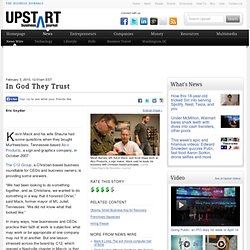

Should Pastors Know How Much Church Members Give? A recent study found that churches where pastors know how much is donated and by whom were more likely to be doing well financially. However, only half of the 3,000 responding congregations (and only 39 percent of evangelical ones) told the Lake Institute on Faith and Giving that their pastors knew this information. What experts said (starting with "yes" and moving to "no"): "This notion of pastors not knowing how much people give is a recent development, born out of a materialistic, individualistic society.
As a pastor, you're the doctor of the congregation. You've got to be looking at diagnostic information, and there's none better than financial giving. " "A pastor doing ministry should have access to financial data and use it in ways that are prescriptive, descriptive, and diagnostic. "Our research found 83 percent of pastors think most church members don't want them to know how much individuals give, while 78 percent think the information can help assess a member's spiritual health.
Wp-content/uploads/2013/04/Open-Letter-from-Economists-on-the-Charitable-Deduction.pdf. The charitable tax deduction is worth its weight. Altruism is linked to oxytocin (often called the "cuddle hormone"),… (Los Angeles Times ) The most charitable person I ever met never made a gift to an organized charity to the best of my knowledge.

She was Filipino, the mother of one of my co-workers, and year after year she would listen to the needs and dreams of her friends and neighbors. Then very quietly she would slip them what she could afford, carefully jotting down the amount, the purpose and date on little slips of paper. Pastor, Are You Using Twitter? When it comes to technology and social media, I am pretty much a geek at it…well let’s just call it what it is, I am a geek at it.

You could also call me a geek when it comes to wanting to share the Gospel and utilize technology in doing so. I think in this day in age we are up against some pretty difficult odds if we think we are going to reach people using “old school” tactics. A door to door approach or only a mailer coming to a house once a year isn’t going to cut it. Whether it’s with the next generation, or any generation really today, there is one area we can think of utilizing as believers and especially as Pastors and leaders of the church, and that is social media.
Primarily in this discussion, let’s talk about Twitter. I have had multiple conversations with Pastors young and old and typically hear and see the same thing. I can’t argue that if a Pastor does not use Twitter, that he isn’t Biblical or anything like that, but I would definitely ask – Why Not? Still not convinced? Open Season on Wealthy Donors: The Atlantic Swings and Misses. Using Photographs of Human Suffering In Order to Encourage Charitable Giving. When photojournalists capture images of human suffering around the world, they’re often accused of being coldhearted and of exploiting those in need.

The media organizations and charities that send them out draw similar criticism, but they argue that these negative stories help bring attention to issues that would otherwise be ignored and that they help encourage charitable giving. Due to the sensitive nature of these types of stories, organizations generally tread very carefully when putting out requests for photos and footage. However, that’s not always the case. morealtitude, an Australian photographer who blogs about travel and aid work, writes that he recently came across a request from an NGO’s fundraising office that “floored him.” Here’s an except of what the instructions for the media crew said: Detailed Story Request:Children under 12 are suggested for the story case main character. This is Not an April Fool’s Post [Wanderlust via duckrabbit via Humanosphere]
10 Things Advisors Need to Know About Charitable Giving. What It Means To Be A Philanthropist. Faith-based Business. Kevin Mack and his wife Shauna had some questions when they bought Murfreesboro, Tennessee-based Alco Products, a sign and graphics company, in October 2007.

The C12 Group, a Christian-based business roundtable for CEOs and business owners, is providing some answers. “We had been looking to do something together, and as Christians, we wanted to do something in a way that it honored Christ,” said Mack, former mayor of Mt. Juliet, Tennessee. “We did not know what that looked like.” In many ways, how businesses and CEOs practice their faith at work is subjective; what may work or be appropriate at one company may not fit at another. “You can’t be one person on the weekend and another person Monday through Friday,” said Troy Blackmon, owner and chairman of the Nashville C12 Group, which partly bills itself as a board of directors for small- to midsize companies. He eventually discovered the C12 Group, founded in Tampa 18 years ago and now based in Greensboro, North Carolina. The Rise of Mobile Giving, and Other Trends & Predictions for Philanthropy in 2013.
Next blog. Uncategorized.